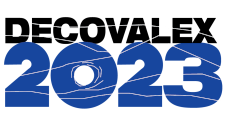
Quintessa recently participated in the 7ᵗʰ workshop of the DECOVALEX project, hosted by the Korean Atomic Energy Research Institute (KAERI) in Busan, South Korea. The DECOVALEX project (DEvelopment of COupled models and their VALidation against EXperiments) is an international research and model comparison collaboration for advancing the understanding and modelling of coupled thermo-hydro-mechanical-chemical (THMC) processes in geological systems. The project is currently nearing the end of its 8th phase, DECOVALEX-2023.
Quintessa is involved in several aspects of the DECOVALEX-2023 project, including technical modelling as well as project and task coordination.
- Task E: Modelling of brine migration under complex THM conditions based on the salt heater test (BATS) at the WIPP disposal facility.
- Quintessa are participating in this task with funding from Nuclear Waste Services (NWS). Claire Watson presented Quintessa's latest results (based on work by both her and Steven Benbow) using a model with elastic and visco-plastic components, considering the impact of Excavation Damaged Zone (EDZ) development on brine flux.
- Task F2: A performance assessment task considering radionuclide migration from a generic repository in salt host rock in a shaft seal failure scenario.
- Alex Bond presented Quintessa's modelling results using QPAC, with COMSOL and GoldSim also used for benchmarking. The model considered sensitivities to shaft properties and the rate of brine inflow.
- Task C: THM modelling of the Full-scale Emplacement test at Mont Terri URL.
- Kate Thatcher and Rebecca Newson are co-leading this task along with the Swiss Federal Nuclear Safety Inspectorate (ENSI), who are funding Quintessa's involvement in the task.
- Task G: THM laboratory-scale single fracture analysis.
- This task involves support from the University of Edinburgh and NWS through a co-funded PhD student, Gonçalo Cunha. Gonçalo presented his ongoing work on characterising fracture aperture spatially-correlated variability and using this information in coupled THM analyses.
- Task A: Tensile fracturing in the Callovo-Oxfordian formation due to fluid over-pressure.
- NWS previously funded work in this task; Quintessa plan to support the planned publications in this task on the basis of the previously completed work. Alex Bond attended the task workshop to support the publication process.
In addition to participating in Task F2, Alex Bond is also the Technical Coordinator for the whole DECOVALEX project and chaired several sessions at the latest workshop, including a discussion of planned tasks for the next phase of DECOVALEX.
The workshop ran as a hybrid meeting, with Quintessa employees taking advantage of the flexibility to participate both virtually and in-person in South Korea. Following the workshop, the in-person participants were treated to technical visits of the Wolsong disposal facility for low- and intermediate-level waste (WLDC) and the Wolsong nuclear power plant.
The final workshop and symposium of the DECOVALEX-2023 project will be held in Troyes, France in November 2023.

Left to right: Gonçalo Cunha, University of Edinburgh; Rebecca Newson and Alex Bond, Quintessa; Simon Norris, NWS